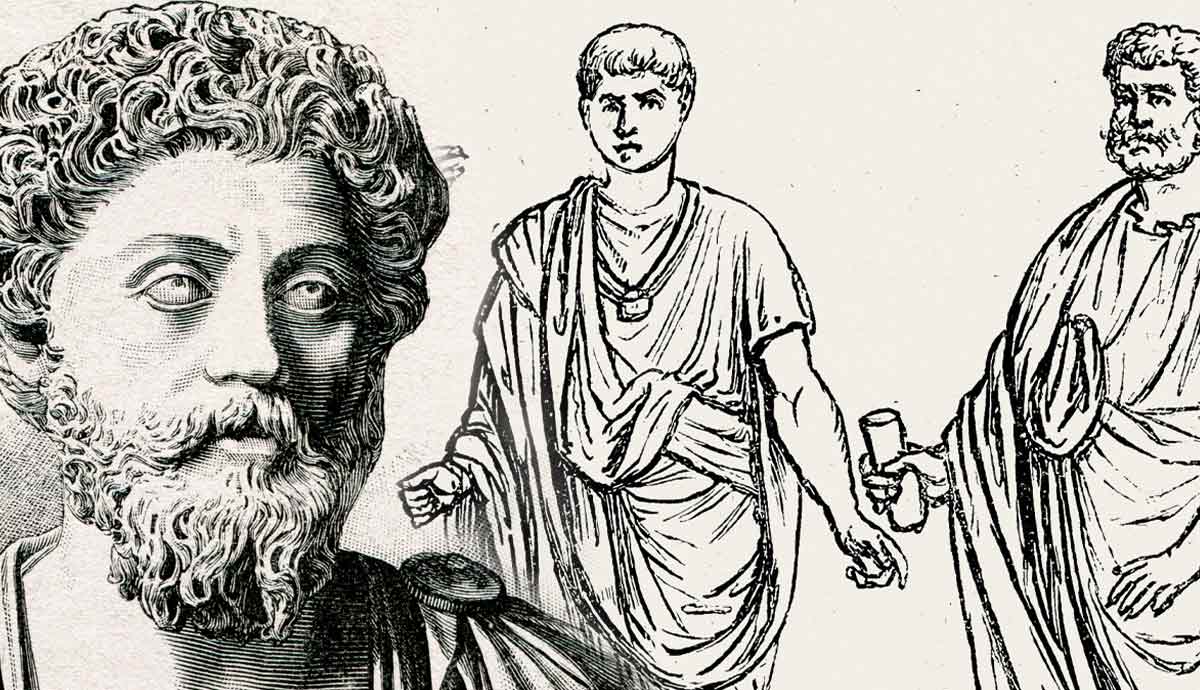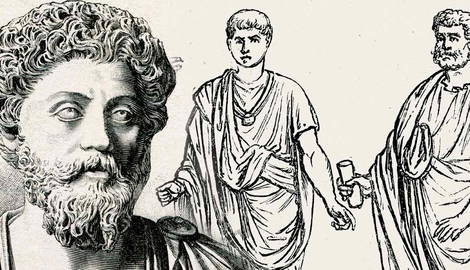
Roman philosophy generally shared an interest in studying the art of living. Ancient Roman schools of philosophy often wanted to answer the question: how does one live best? And they all proposed answers, albeit with important differences, on how the individual is to achieve this. This article explores five key Roman schools of philosophy—Stoicism, Epicureanism, Neoplatonism, Skepticism, and Cynicism—along with some of their major proponents. The article also examines the historical importance of these schools.
Historical Background of Philosophy in Ancient Rome

To understand philosophy of the Ancient Roman period, we must consider the historical context from which it grew. With the Roman Empire’s expansion came big changes to the everyday life of its citizens. New political systems developed and diverse cultures intermingled more frequently. Many felt as though the changes occurred too fast for adaptation, as if too much was out of their control. People yearned for control, and thus a new focus developed which centered on individual and practical concerns. Therefore, philosophical examination during this period was more individualistic, as a person’s life was easier to control than the sweeping forces of change in history. Roman philosophy generally studied the art of living. All of the most important schools of philosophy proposed different answers on how the individual is to achieve this. Among the different methods proposed, Stoicism would prove to be the most popular historically.
1. Stoicism

Of all the Roman schools of philosophy, Stoicism was probably the most popular and best adapted to its historical context. The founder of Stoicism was Zeno of Citium (336-264 BCE), who was known to provide popular lectures from a “stoa,” or “porch”—hence the name “stoicism.” Those subsequently categorized as “Stoic philosophers” explored various topics and there were significant differences among them, but they all shared the pursuit of a vision of how each individual is to live best.
The Stoics also generally shared the view that the universe was orderly and that we each have a particular role in this universal community. Essentially for the Stoics, everything happens for a reason because there is a divine purpose to events. For this reason, the Stoics generally emphasized the importance of one’s civic duty: we are each a part of the celestial plan, and thus we should focus on how we each individually live out our personal roles best. This submissive mentality was very appealing for people living in an empire growing so quickly and so large. The three leading Stoic philosophers were Epictetus, Seneca, and Marcus Aurelius—three diverse individuals with different life experiences who nevertheless focused on achieving inner peace.
Epictetus was a slave who was severely tortured—he allegedly learned to endure pain, including having his leg purposefully broken, with complete composure. He was eventually freed, and took those lessons in ataraxia, or “peace of mind,” to share with others, becoming a popular teacher of his time.

Seneca also endured intense torture and turmoil, both physical and emotional, during his life, but from a position of higher social stature. Seneca published many works during his lifetime and they were generally well-received. His philosophy concluded that what makes our lives good are the attitudes we take toward our lives. Tragically, his “destiny” of becoming a senior advisor to Emperor Nero proved disastrous. The increasingly violent Nero forced Seneca to commit suicide upon believing that Seneca had plotted to assassinate him. It was allegedly a gruesome death—Seneca was forced to slit his wrists, though when that did not work fast enough, he added poison and a hot bath to speed up the process.
The philosopher whose popularity has really stood the test of time is Marcus Aurelius. While Seneca wrote to share his words with others, Marcus Aurelius wrote for himself, but his personal diary, titled Meditations, is still widely popular. He wrote Meditations during his military campaigns and is considered the last great Ancient Stoic philosopher. He shared the Stoic idea that everything that happens is part of a divine plan, which allows one to feel strength and courage in the face of challenges and misfortunes. Thus, death is not to be feared, and we must work to avoid negative emotions such as anger that do not enable one to achieve inner peace. There is much that is not within our control, but we do have control over how we respond to that reality.
2. Epicureanism

Chronologically, Epicureanism was developing simultaneously as Stoicism, but with some key differences. The founder of Epicureanism was Epicurus (341-270 BCE). While the Stoics developed a more defensive philosophy, Epicureanism was broader in its aims, as the Epicureans more than the Stoics lived out their philosophy more directly. Epicurus founded “the Garden,” a place that was open even to women and slaves, where a close-knit community lived out the practices of the philosophy. His view on how to live best was to “pursue pleasure and avoid pain”—but this is often grossly misunderstood to refer to excessive hedonism.
Epicurus modeled a moderate life that focused on avoiding that which troubles the mind and body. He promoted a kind of medicine for the soul where we should pursue what makes us feel happy inside, but in a soberly rational way—the less we need, the happier we will find ourselves. While the Stoics sought peace through the belief in a divinely ordered universe, conversely the Epicureans thought there was no order; things happened by chance. The Gods, Epicurus argued, are already living the ideal life we mortals are pursuing and so they do not really care about what happens to us—thus, like the Stoics, the Epicureans argue that death should not be feared. This is a key way to achieve inner peace because there is very little feared more than death.
3. Neoplatonism

While the Epicureans focused little on the role of religion, the Neoplatonists developed a very spiritual philosophy. The founder of Neoplatonism was Plotinus (204/5-270 CE), and as its name references it was a kind of rebirth of Platonism, but with a more spiritual focus. Plotinus argued that there is a hierarchy of reality that culminates in “the One,” not so unlike the way there is a super Form of all Forms in Plato’s philosophy. The next emanation in the hierarchy is the mind or intellect, followed by the world soul (of which we each have a soul that is a part of this), and finally matter, the lowest part of reality.
Thus, the mind is superior to matter, and we commit bad acts when we lose sight of this. Reality, therefore, stems from the mind—the philosophy of Idealism traces back to Neoplatonism. Neoplatonism was also appealing to the early Christian Philosopher, Saint Augustine, in his endeavor to climb the hierarchy to unite with “the One” but there are some key differences from Christian views generally.
4. Skepticism

The next schools of philosophy to be discussed, Skepticism and Cynicism, had the least impact but are still important to consider. After all, the terms “skeptic” and “cynic” are still widely used today. The most well-known Skeptic philosopher is Pyrrho of Ellis (360-272 BCE). What we know about Pyrrho comes from later writers, as none of his writing survived. His basic conclusion was that we cannot really know anything about the world. This, he argued, was the way to achieve peace in one’s life: to resign completely from the belief that anything can really be fully understood. Thus, we must learn to enjoy the present moment. While such extreme skepticism did not take root, his contribution of reminding us to, at the very least, have a healthy dose of skepticism from time to time is an important contribution to the history of philosophy.
5. Cynicism

As we have seen, despite the differences between all these Ancient Roman philosophies, they do share an emphasis on the self and how to best live one’s life. The etymological origins of the term “cynic” mean “dog-like,” which says a lot about the nature of Cynicism. Like the other schools of thought, it was meant to be a way of life for the individual. But the Cynics were disparaged as they lived in vulgar conditions, doing any personal business in public without a care, including urinating and masturbating. They did this because they believed living virtuously meant living in full accordance with nature by casting aside artificial societal conventions. One of the most important Cynics, Diogenes of Sinope, was approached by Alexander the Great who offered him riches to change his unconventional lifestyle. Diogenes simply told the famous ruler to “stop blocking the sun.” The Cynics’ answer on how to live, understandably, did not take root after this brief stint, but they did make interesting contributions to discussions on how best to live.
Schools of Philosophy in Ancient Rome: Historical Significance

While all these philosophies born in the period of Ancient Rome were very different and are certainly not free of important objections, they did continue important discussions to what is the long conversation that is the history of philosophy. While Stoicism has proven to be the most popular, some charge that it is too cold. Epicureanism is misunderstood to be too hedonistic. While offering different perspectives, together they elaborated on the philosophical discussions of freedom and determinism, as well as how to live a good life and idealism. Parts of Stoic and Neoplatonist views would penetrate the Christian worldview that would develop next in the history of philosophy. Regardless of where one stands today on these philosophical and religious topics, the terms “stoic,” “epicurean,” “skeptic,” and “cynic” are still very pervasive in our vocabulary, which is a testament to the impact of these philosophies.










